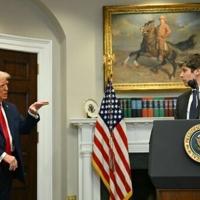Trump Advocates for AI Deregulation, Receives Robust Support from Major Tech Companies

Tech Companies Push for Looser AI Regulations
Major technology companies are urging the Trump administration to relax regulations surrounding artificial intelligence (AI) development. They argue that doing so is essential for maintaining the United States’ competitive edge, particularly against China.
Initially, the rapid advancements in generative AI alarmed governments, prompting them to implement stricter guidelines. Tech companies swiftly incorporated AI into their systems, but the urgency for regulatory measures caught many off guard. As of January, the Trump administration has shifted its focus towards hastening AI progress, sidelining fears about issues like hallucinations in AI outputs, deepfake technology, and potential job losses.
“The AI future is not going to be won by worrying excessively about safety,” said Vice President JD Vance during a recent AI summit in Paris. His comments have raised concerns among international partners, particularly European officials who had heralded the establishment of the EU AI Act to ensure responsible AI governance. In light of the US’s evolving perspective, European leaders are starting to emphasize innovation and investment over strict safety measures. David Danks, a professor of data science and philosophy at the University of California San Diego, noted, “We’re likely to see a noticeable reduction in regulatory efforts worldwide.”
The Shift in Regulatory Focus
With the US administration’s new approach, technology firms are excited about the possibility of less regulation. They claim previous measures under the Biden administration constrained their ability to innovate. One of Trump’s first moves was to reverse Biden’s proposals for basic safeguards for powerful AI systems. Karen Silverman, the CEO of AI advisory firm Cantellus Group, remarked, “We’re clearly stepping back from the idea of having a cohesive approach to AI regulation.”
The Trump government is inviting industry leaders to contribute their perspectives on AI policy. The goal is to ensure the US remains the “undeniable leader in AI technology” with minimal restrictions for investors. Feedback from the industry will shape an anticipated AI action plan from the White House this summer.
A significant theme is emerging from industry responses, indicating that China is viewed as a major threat that requires an unregulated environment for US firms to compete. OpenAI’s feedback notably emphasized the competitive risk posed by a Chinese-developed AI model called DeepSeek, which was created at a lower cost than American alternatives. OpenAI argued that US AI innovation must be protected from authoritarian powers and excessive regulations that hinder progress.
- OpenAI is advocating for a lack of federal and state-level regulations on AI.
- It is currently involved in legal disputes over its AI training practices involving copyrighted material.
Mixed Responses from the Industry
Other industry leaders are also responding to this regulatory shift. Meta (formerly Facebook) highlighted the importance of its Llama AI model as crucial for maintaining US technological superiority over China. CEO Mark Zuckerberg even suggested imposing tariffs in retaliation against increased European regulation.
Google’s emphasis has been on the need for substantial infrastructure investments to support AI’s significant energy requirements, while also opposing state-by-state regulations, claiming that such efforts could undermine America’s leadership in technology.
Despite the industry’s push for minimal oversight, experts warn that generative AI poses inherent risks, whether or not government regulations are in place. David Danks cautioned, “Negative public perception will affect companies if their technology leads to severe problems. They must proactively address these risks.”
Overall, as the landscape of AI development continues to evolve, the balance between innovation and regulation remains a contentious issue among industry leaders and policymakers.





